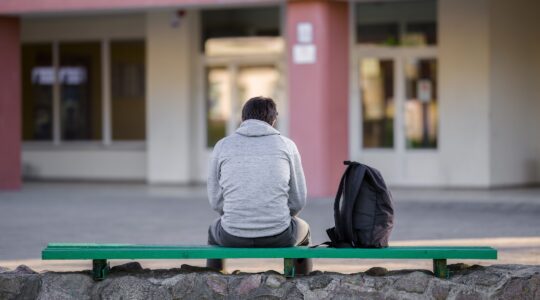In The New York Times of April 20, 1944 — corresponding to Nisan 27, the day we now observe as Yom HaShoah — there was a report of New York Jews observing, without quite realizing it, without having a name for it, the very first Yom HaShoah tied, as it is now, to the anniversary of the 1943 Warsaw Ghetto uprising.
Then, as now, the commemoration was postponed from the date the uprising began (the day of the first seder) to a weekday shortly after the holiday.
It was a Wednesday morning in a wartime April when, at 11 a.m., “Jewish workers in stores, shops, factories and in their homes — everywhere except in war plants — ceased working for 10 minutes,” standing for
some minutes in silent prayer, and then telling of the ghetto’s heroism through six weeks of fighting.
That morning in 1944, at the Warsaw shul on the Lower East Side, “a thousand worshippers crowded into a building designed to hold less than half that number,” reported the Times. “They stood shoulder to shoulder in the aisles. They poured into the balconies until the topmost row appeared to touch the ceiling. Others packed the tiny entrance solidly so that it was impossible to go out or come in.”
Outside, “thousands more overflowed into Rivington Street and nearby Allen, Eldridge and Forsyth Streets. They mourned in the open…”
They marched on City Hall, crowds spreading “out over the streets, flowing onto sidewalks,” a few carrying signs: “Avenge the blood of the Polish ghetto,” and “Three million Jews have been murdered by the Nazis! Help us rescue the survivors.”
Among the marchers, amazingly, was a family of four refugees from the Warsaw ghetto who somehow got out “only two weeks before the battle.” They gave first-person testimony to conditions there.
They reached City Hall at 12:15 p.m. and stood for 45 minutes. “There was little conversation, no noise,” noted the Times, “as they waited for a chance to beg for help for European Jews…”
Mayor Fiorello LaGuardia finally emerged. The Jews would be rescued, he told the crowd, but “it will not be the case of making an appeal to the Nazi brutes. It will be a matter of the hot bullets of machine guns and then the cold steel of bayonets of the United Nations, until every Nazi murderer is chased out of Poland.”
In 2009, the Israeli paper Yisrael Hayom (April 20) fears, “The world” does not remember, with Iran’s Mahmoud Ahmadinejad, the Holocaust denier who promises to annihilate Israel, addressing the conference in Geneva on racism “symbolically being held” on Yom HaShoah. Our enemies “understand very well,” said the paper, “that the way to eliminating the ‘Zionist entity’ starts with eroding the memory of the Holocaust.”
In fairness to “the world,” Maariv counters (April 20), “At the 1938 Evian Conference” on Jewish refugees, “the world refused to stand alongside the Jews and allowed Hitler to murder them.” At the 2009 conference, “a single voice is rising from Washington, Canberra, Berlin, Rome, Ottawa and Jerusalem: Not again.”
Perhaps even more remarkable was the rebuke on Al-Jazeera (April 19) by an Egyptian. Egypt once had its own leader, Gamel Abdul Nasser, who swore to annihilate Israel.
MEMRI, the Middle East Media Research Institute, provided video of Egyptian writer Magdi Khalil pointing out the irony of Ahmadinejad, “this racist president,” attending a conference “against racism. This president calls for the destruction of a state that is a UN member. How can this possibly be? … Some people may believe that Zionism is tantamount to racism, but many people around the world believe that Islamic religious law, as implemented in Somalia, Afghanistan, Sudan, and Saudi Arabia, is worse than racism.”
The world changes and is changing, sometimes more than we suppose.
Israel pulled its ambassador from Switzerland in protest of the Swiss president meeting with Ahmadinejad, but for all the European anti-Zionism, the Swiss papers stood with Israel.
Jürg Müller in the Bern paper, Der Bund, said Ahmadinejad was not just anti-Zionist but “anti-Semitic … the most prominent representative of dictatorships and authoritarian regimes.”
The Blick, Switzerland’s largest circulation daily, said the conference was a “foreseeable disgrace” and captioned a photo of Ahmadinejad as “Picture of hatred.”
One of the Swiss news sites pointed out that the first Zionist conference was held in Basle, Switzerland, in 1897, as were 15 other Zionist conferences.
Germany’s Deutsche Welle headlined: “Israel Compares Iran To Nazi Germany,” all the more biting in the original German.
Perhaps something redemptive is in the air, this week of Yom HaShoah. Rabbi Michael Lerner e-mails from California, “One of the tropes about liberal media is that the liberals never criticize the craziness in the Arab or Muslim world, particularly not the liberal Jewish media. So, I’d like you to write something in The Jewish Week covering Tikkun’s denunciation of Ahmadinejad.”
Fair enough. Rabbi Lerner’s denunciation is being picked up by The Huffington Post and the leftist Daily Kos.
The disgrace in Geneva, Rabbi Lerner says, “gives another victory to the Israeli right.”
Rabbi Lerner gives a lesson in history and affirmative action: The “resolute opposition of the Palestinian movement to allowing Jewish refugees from coming to Palestine during and after the Holocaust, set the stage for the first act of global affirmative action: the vote by the United Nations to create the State of Israel. Had the Palestinian people accepted the UN division of Palestine, the two states that Palestinians seek today would have already been in existence.”
It’s not that Rabbi Lerner thinks Israel is beyond criticism, far from it, but he recognizes that “one reason why the peace forces are unable to win majority support in Israel or among the Jewish people as a whole is that too many Arabs and Palestinians seek, not a two-state solution, but the total elimination of the State of Israel as a Jewish homeland.” He also noted “the anti-Semitism that led to the flight of some one million Jews from Arab countries between 1947 and 1967.”
Since this column has criticized Rabbi Lerner in the past, in the spirit of Jewish unity and love that Yom HaShoah inspires, I should add that Rabbi Lerner’s critique always seemed to me to be “l’shaym shamayim,” for the sake of Heaven, something not always true of Israel’s Jewish critics. To hear him passionately sing zemirot at a Shabbat table is to sense it all the more.
Rabbi Lerner raised a son who loved Israel enough to enlist in the Israeli army, in the 1990s. As an only child, the son couldn’t enter a combat unit without a parent’s consent. Rabbi Lerner gave his blessing.
At the time, Rabbi Lerner said, “every young Jewish person should spend some years serving the Jewish people, be it in the military, or a peace corps situation, or teaching Hebrew… I was proud of him.”
Rabbi Lerner recently had surgery for lung cancer. His Hebrew name is Meecha’el ben-Beyla (v’Yosef Chayim).
E-mail: jonathan@jewishweek.org
The New York Jewish Week brings you the stories behind the headlines, keeping you connected to Jewish life in New York. Help sustain the reporting you trust by donating today.




